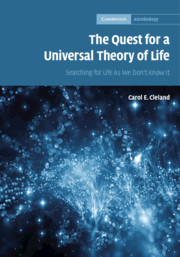Crossref Citations
This Book has been
cited by the following publications. This list is generated based on data provided by Crossref.
2010.
The Nature of Life.
p.
295.
Mariscal, Carlos
Barahona, Ana
Aubert-Kato, Nathanael
Aydinoglu, Arsev Umur
Bartlett, Stuart
Cárdenas, María Luz
Chandru, Kuhan
Cleland, Carol
Cocanougher, Benjamin T.
Comfort, Nathaniel
Cornish-Bowden, Athel
Deacon, Terrence
Froese, Tom
Giovannelli, Donato
Hernlund, John
Hut, Piet
Kimura, Jun
Maurel, Marie-Christine
Merino, Nancy
Moreno, Alvaro
Nakagawa, Mayuko
Peretó, Juli
Virgo, Nathaniel
Witkowski, Olaf
and
James Cleaves, H.
2019.
Hidden Concepts in the History and Philosophy of Origins-of-Life Studies: a Workshop Report.
Origins of Life and Evolution of Biospheres,
Vol. 49,
Issue. 3,
p.
111.
Cleland, Carol E.
2019.
Moving Beyond Definitions in the Search for Extraterrestrial Life.
Astrobiology,
Vol. 19,
Issue. 6,
p.
722.
Seyler, Lauren
Kujawinski, Elizabeth B.
Azua-Bustos, Armando
Lee, Michael D.
Marlow, Jeffrey
Perl, Scott M.
and
Cleaves II, Henderson James
2020.
Metabolomics as an Emerging Tool in the Search for Astrobiologically Relevant Biomarkers.
Astrobiology,
Vol. 20,
Issue. 10,
p.
1251.
Irwin, Louis N.
and
Schulze-Makuch, Dirk
2020.
The Astrobiology of Alien Worlds: Known and Unknown Forms of Life.
Universe,
Vol. 6,
Issue. 9,
p.
130.
Katz, Stephen L.
Padowski, Julie C.
Goldsby, Michael
Brady, Michael P.
and
Hampton, Stephanie E.
2020.
Defining the Nature of the Nexus: Specialization, Connectedness, Scarcity, and Scale in Food–Energy–Water Management.
Water,
Vol. 12,
Issue. 4,
p.
972.
Vickers, Peter
2020.
Expecting the unexpected in the search for extraterrestrial life.
International Journal of Astrobiology,
Vol. 19,
Issue. 6,
p.
482.
Gómez-Márquez, Jaime
2020.
What are the principles that govern life?.
Communicative & Integrative Biology,
Vol. 13,
Issue. 1,
p.
97.
Bains, William
2020.
Getting Beyond the Toy Domain. Meditations on David Deamer’s “Assembling Life”.
Life,
Vol. 10,
Issue. 2,
p.
18.
Lupisella, Mark
2020.
Cosmological Theories of Value.
p.
171.
Butch, Christopher J.
Meringer, Markus
Gagnon, Jean-Sebastien
and
Cleaves, H. James
2021.
Open questions in understanding life’s origins.
Communications Chemistry,
Vol. 4,
Issue. 1,
Valente, Daniel
2021.
Self-replication of a quantum artificial organism driven by single-photon pulses.
Scientific Reports,
Vol. 11,
Issue. 1,
Cleland, Carol E.
Hazen, Robert M.
and
Morrison, Shaunna M.
2021.
Historical natural kinds and mineralogy: Systematizing contingency in the context of necessity.
Proceedings of the National Academy of Sciences,
Vol. 118,
Issue. 1,
Gómez-Márquez, Jaime
2021.
What is life?.
Molecular Biology Reports,
Vol. 48,
Issue. 8,
p.
6223.
Impey, Chris
2021.
Astrobiology.
p.
135.
Guttenberg, Nicholas
Chen, Huan
Mochizuki, Tomohiro
and
Cleaves, H.
2021.
Classification of the Biogenicity of Complex Organic Mixtures for the Detection of Extraterrestrial Life.
Life,
Vol. 11,
Issue. 3,
p.
234.
Kempes, Christopher P.
and
Krakauer, David C.
2021.
The Multiple Paths to Multiple Life.
Journal of Molecular Evolution,
Vol. 89,
Issue. 7,
p.
415.
Schulze-Makuch, Dirk
2021.
The Case (or Not) for Life in the Venusian Clouds.
Life,
Vol. 11,
Issue. 3,
p.
255.
Hazen, Robert M.
2021.
Reply to “A comment on ‘An evolutionary system of mineralogy: Proposal for a classification of planetary materials based on natural kind clustering’”.
American Mineralogist,
Vol. 106,
Issue. 1,
p.
154.
Cleland, Carol E.
and
Rimmer, Paul B.
2022.
Ammonia and Phosphine in the Clouds of Venus as Potentially Biological Anomalies.
Aerospace,
Vol. 9,
Issue. 12,
p.
752.



